|
De Puertoricaanse dichter José Gautier Benítez werd geboren op 12 april 1848 in Caguas. Zie ook mijn blog van 12 april 2007 en ook mijn blog van 12 april 2009 en ook mijn blog van 12 april 2010.xml:namespace prefix = o ns = "urn:schemas-microsoft-com:office:office" />
Uit: Puerto Rico (Fragment)
Above the waters of the sea, which you rule;
A vase of flowers, swaying
Among foam and coral, perfumes and pearls;
You, that at evening pour over the sea,
With the colors that your sunset put on,
Another ocean of floating flames;
You, that give me the air I breathe,
And life, and the song that breaks forth of its own accord! . . .
of this (American) world, you are the most beautiful fragment,
O my fatherland! broken off and flung into the sea
By a violent cataclysm.
But you brought only the beauty of the vast continent.
Without copying its pomp, or the terrors of its greatness.
Upon your mountains, neither the tiger, the lion, nor the jaguar
Utters its fierce and terrifying cry,
Nor does the boa constrictor coil upon the plains,
Nor does the untamed and savage alligator
Disturb the pure, transparent water
Of your gentle rivers . . .
Nor do your mountains, shaken upon their foundations,
Sound with sudden tumult.
When, with hoarse, titanic breathing,
Orizaba and Cotopaxi roar.
No Niagara makes your soil tremble
With the fall of its immense cataract.
Where Iris, painter of heaven,
Joins to its borders of shining silver,
Gold and crimson, purple and topaz.
While the condor, monarch of space,
Mirrors himself proudly in its crystal;
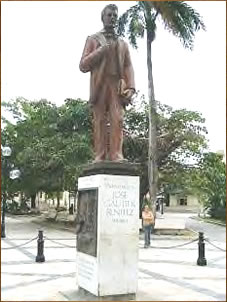
José Gautier Benítez (12 april 1848 24 januari 1880)
Standbeeld in Caguas, Puerto Rico
De Russische toneelschrijver Alexander Nikolajewitsj Ostrovski werd geboren op 12 april 1823 in Moskou. Zie ook mijn blog van 12 april 2007 en ook mijn blog van 12 april 2008 en ook mijn blog van 12 april 2009 en ook mijn blog van 12 april 2010.
Uit: The Storm (Vertaald door Constance Garnett)
SHAPKIN.
Old Dame Kabanova's a good hand at that too!
KUDRIASH.
Yes, but she at least does it all under pretence of morality; he's like a wild beast broken loose!
SHAPKIN.
There's no one to bring him to his senses, so he rages about as he likes!
KUDRIASH.
There are too few lads of my stamp or we'd have broken him of it.
SHAPKIN.
Why, what would you have done?
KUDRIASH.
We'd have given him a good scare.
SHAPKIN.
How'd you do that?
KUDRIASH.
Why, four or five of us would have had a few words with him, face to face, in some back street, and he'd soon have been as soft as silk. And he'd never have let on to a soul about the lesson we'd given him; he'd just have walked off and taken care to look behind him.
SHAPKIN.
I see he'd some reason for wanting to get you sent for a soldier.
KUDRIASH.
He wanted to, right enough, but he didn't do it. No, he won't get rid of me; he's an inkling that I'd make him pay too dear for it. You're afraid of him, but I know how to talk to him.
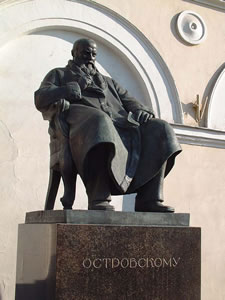
Alexander Ostrovski (12 april 1823 14 juni 1886)
Standbeeld in Moskou
De Franse schrijver Guillaume-Thomas Raynal (Abbé Raynal ) werd geboren op 12 april 1713 in Lapanouse de Séverac. Zie ook mijn blog van 12 april 2007 en ook mijn blog van 12 april 2009 en ook mijn blog van 12 april 2010.
Uit: l'Histoire des deux Indes
Le département de Saint-Marc est formé par le territoire même du chef-lieu, par la belle plaine des Vérettes, par la petite rivière , et par les Gonaives. Il compte vingt-deux sucreries en blanc, vingt-une en brut, deux cent quatre-vingt-dixhuit cafeteries, trois cent quinze cotonneries, onze cent quatre-vingt-quatre indigoteries , et une cacaotière, quioccupent cinquante mille deux' cent seize noirs.
Le produit de tant de cultures est embarqué à Saint - Marc, où se sont successivement élevées trois cents maisons agréablement bâties. Deux ruisseaux traversent cette ville, et l'air qu'on y respire est pur; mais la rade en est mauvaise. Les fortifications qui l'entourent ont été élevées en partie aux dépens d'un colon qui fut condamné à une amende de cent cinquante mille livres pour avoir fait périr avec une inhumanité sans exemple cinq de ses esclaves.
Vraisemblablement Saint-Marc ne serait pas devenu l'entrepôt de cette partie de la colonie, si les Gonaives eussent été plus tôt peuplées. Ce bourg possède le meilleur port de la côte , et un port qu'il serait aisé de défendre. Il a d*e plus des eaux thermales d'une grande perfection. On les négligea long-temps dans un pays rempli de convalescens et de malades. .Ce ne fut qu'en i772 qu'on y bâtit des bains , des fontaines , quelques logemens commodes, un hôpital pour les soldats et les matelots. xuv- Les colonies nous offrent quelques phénomènes sur le peu contradictoires qu il est impossible de nier, et qui semblent difficiles à concilier.
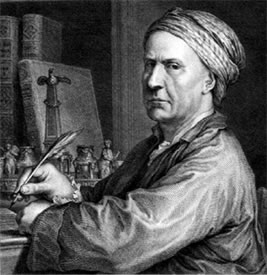
Guillaume-Thomas Raynal (12 april 1713 6 maart 1796)
De Engelse hoveling, dichter en toneelschrijver Edward de Vere, 17e graaf van Oxford, werd geboren op 12 april 1550 in Castle Hedingham. Zie ook mijn blog van 12 april 2009 en ook mijn blog van 12 april 2010.
Womans Changeableness
If women could be fair and yet not fond,
Or that their love were firm not fickle, still,
I would not marvel that they make men bond,
By service long to purchase their good will;
But when I see how frail those creatures are,
I muse that men forget themselves so far.
To mark the choice they make, and how they change,
How oft from Phacbus do they flee to Pan,
Unsettled still like haggards wild they range,
These gentle birds that fly from man to man;
Who would not scorn and shake them from the fist
And let them fly fair fools which way they list.
Yet for disport we fawn and flatter both,
To pass the time when nothing else can please,
And train them to our lure with subtle oath,
Till, weary of their wiles, ourselves we ease;
And then we say when we their fancy try,
To play with fools, O what a fool was I.
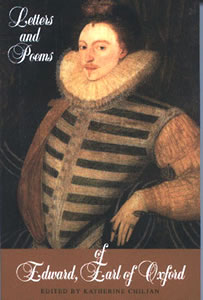
Edward de Vere (12 april 1550 24 juni 1604)
Boekcover
Onafhankelijk van geboortedata:
De Oostenrijkse schrijver Constantin Göttfert werd in 1979 in Wenen geboren. Zie ook mijn blog van 12 april 2010.
Uit: In dieser Wildnis
Zwei Nächte verbrachte ich bei meinem Vater. Du denkst an Berge, wenn du an Österreich denkst, du erinnerst dich an die Luft, die du auf einer deiner Reisen in die Lunge gezogen hast. Vielleicht denkst du daran, wie der Schnee unter deinen Schiern knarzt, oder an Seilbahnen, die über dicht bewaldeten Hängen schaukeln; in Wahrheit jedoch ist das, was ich meine Heimat nenne, eine flachgedrückte Ebene.
Kein Fremder ist jemals an diesem Ort dem Zug entstiegen. Du wärest der erste. Und würdest du dann an der Eingangstür meines Vaterhauses stehen und dich noch einmal zurückwenden, so ginge dein Auge über eine unendliche Fläche aus Feldern und brachliegendem Land, und nichts finge deinen Blick auf, keine Erhebung, kein Wald, nicht die Lichter einer Stadt. Nur die Felder der Sonnenblumen würdest du sehen, die bis an den Horizont reichen, deren Köpfe so schwer sind, dass sie sich kaum bewegen, wenn der Wind an ihnen reißt, und die Stimmen der Kinder hören, die aus der Schule am Ende der Straße kommen; immer noch laufen sie durch dieselben Tore, durch die auch ich gelaufen bin, immer noch lachen sie, stellen sich ein Bein, stecken sich Sonnenblumenkerne zwischen die Zähne und treten sich mit den Spitzen ihrer Schuhe gegen die Schienbeine.
Eben dort, am Rande der Sonnenblumenfelder, stand ich und wartete, bis die Stimmen verstummt waren. In der plötzlichen Stille hörte ich, wie eine leere Medikamentendose über die Gitterstäbe eines Kanaldeckels rollte.
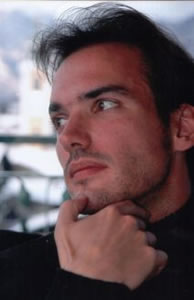
Constantin Göttfert (Wenen, 1979)
|



